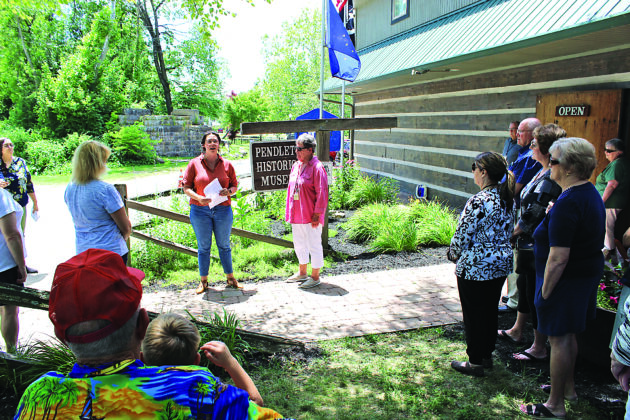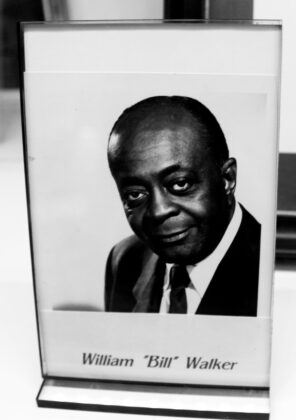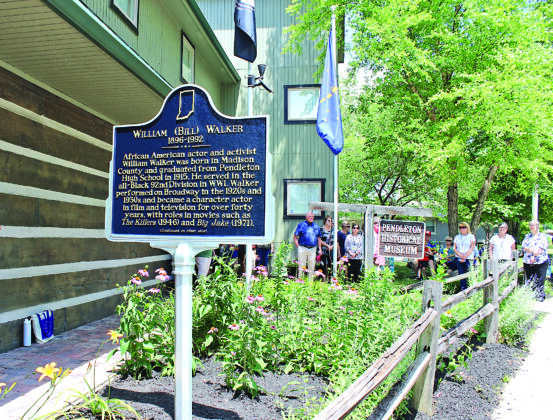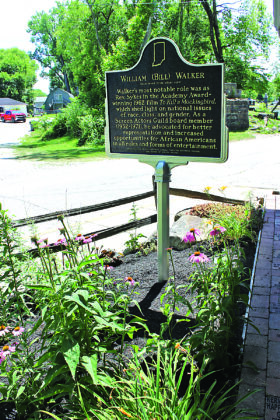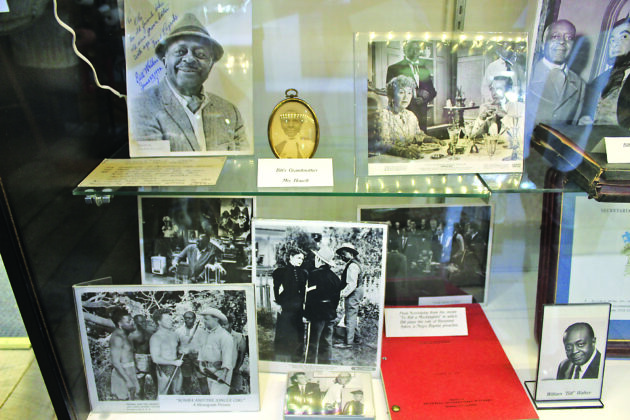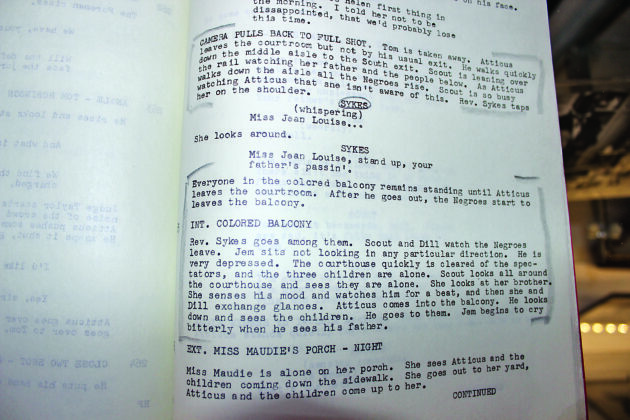
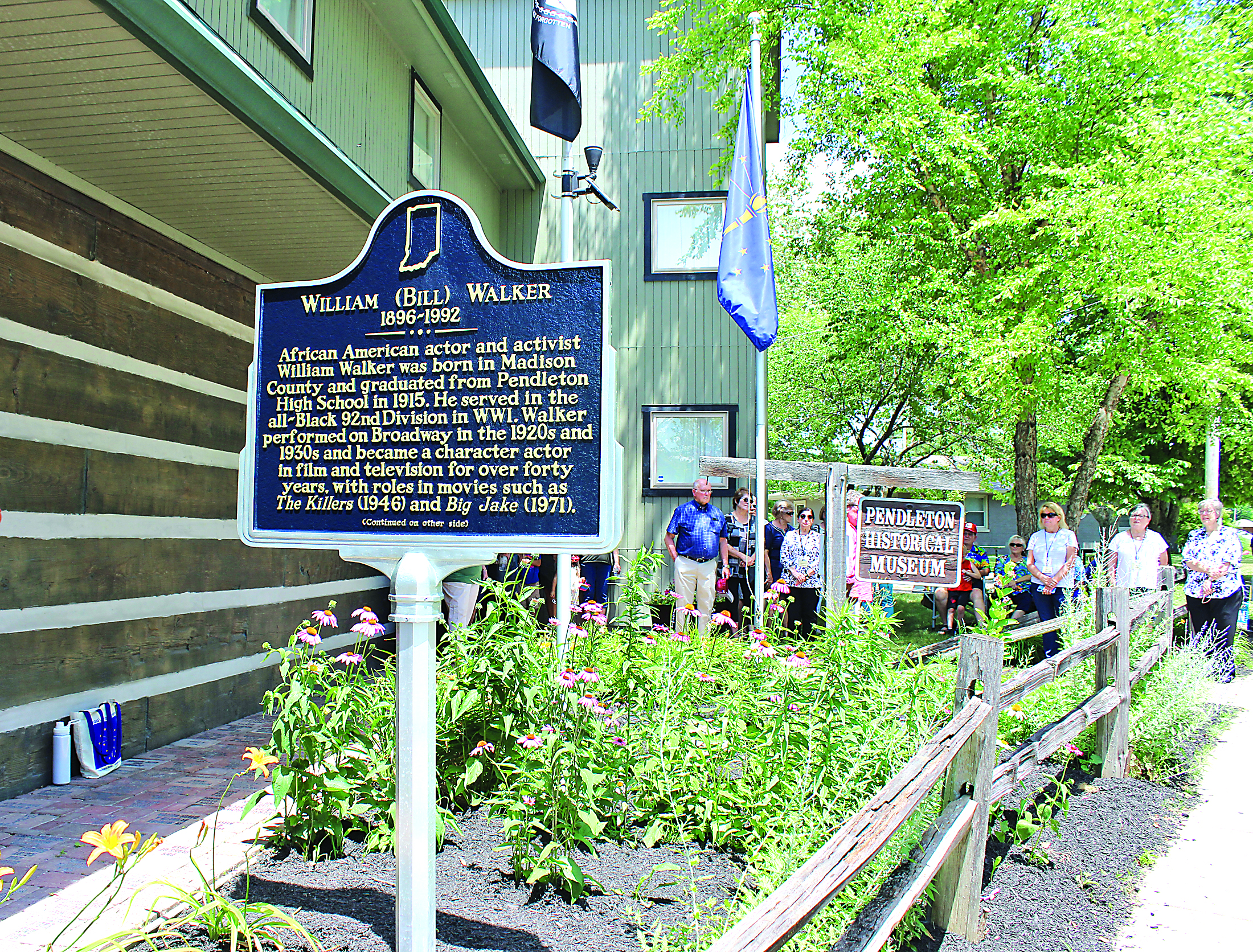
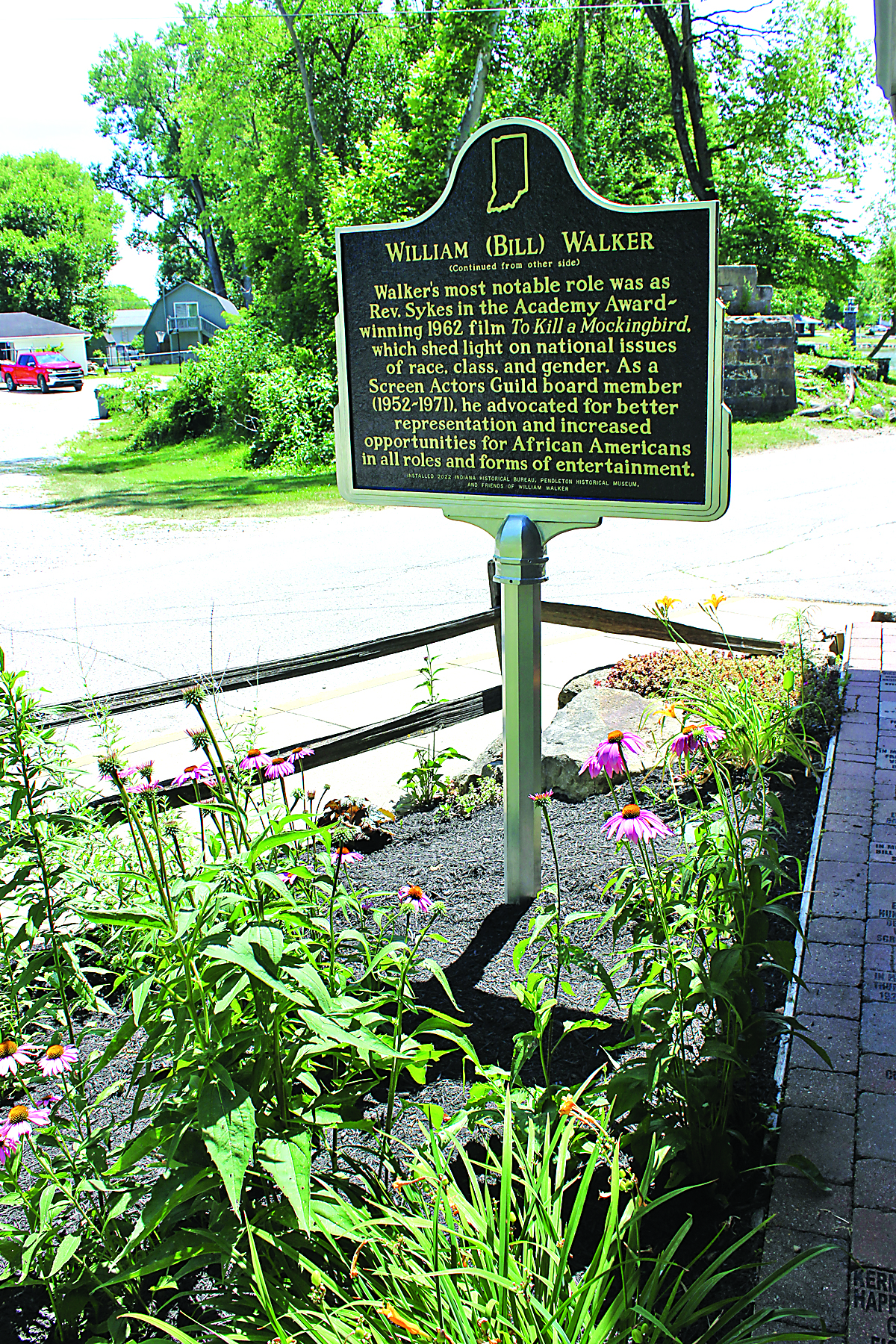
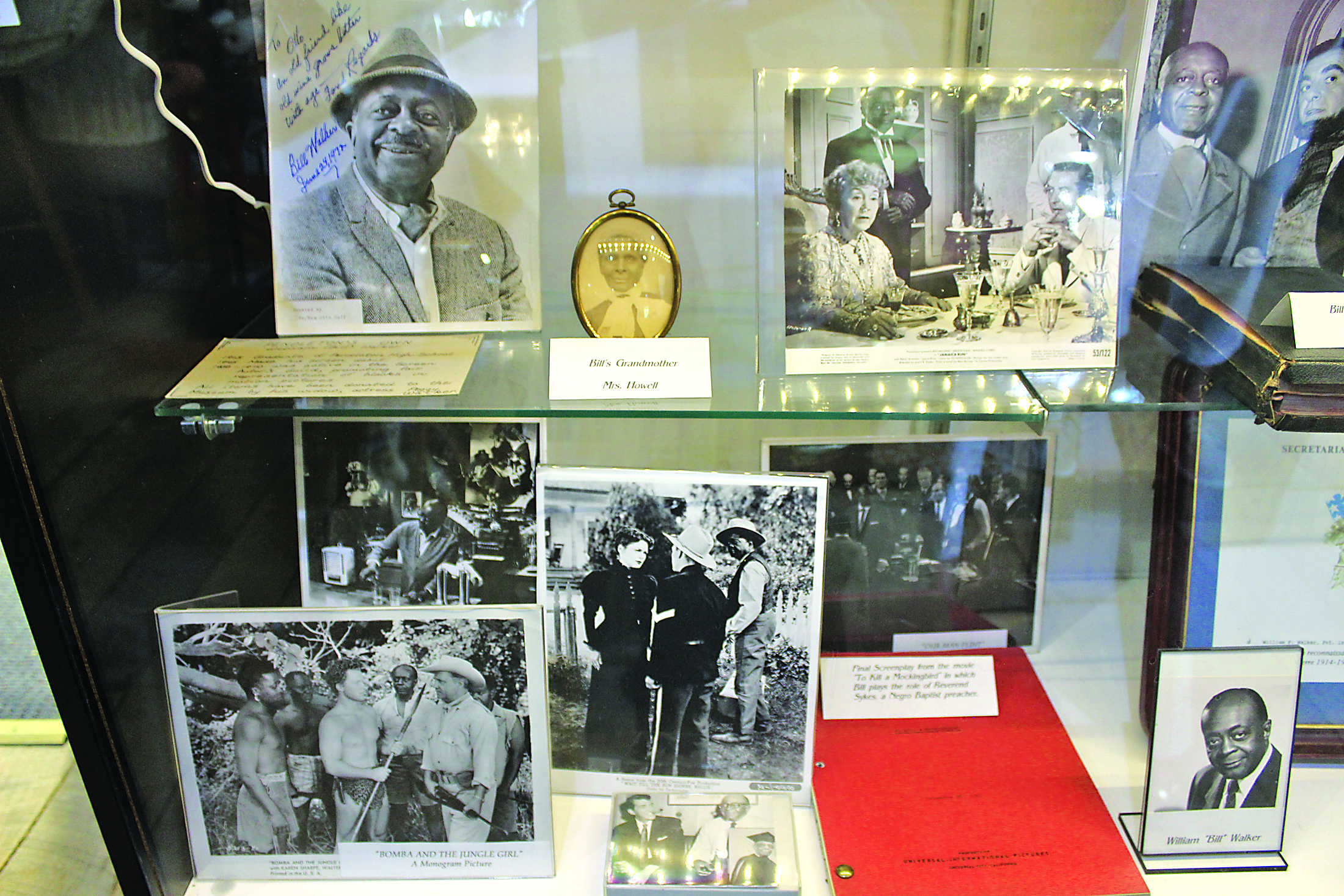

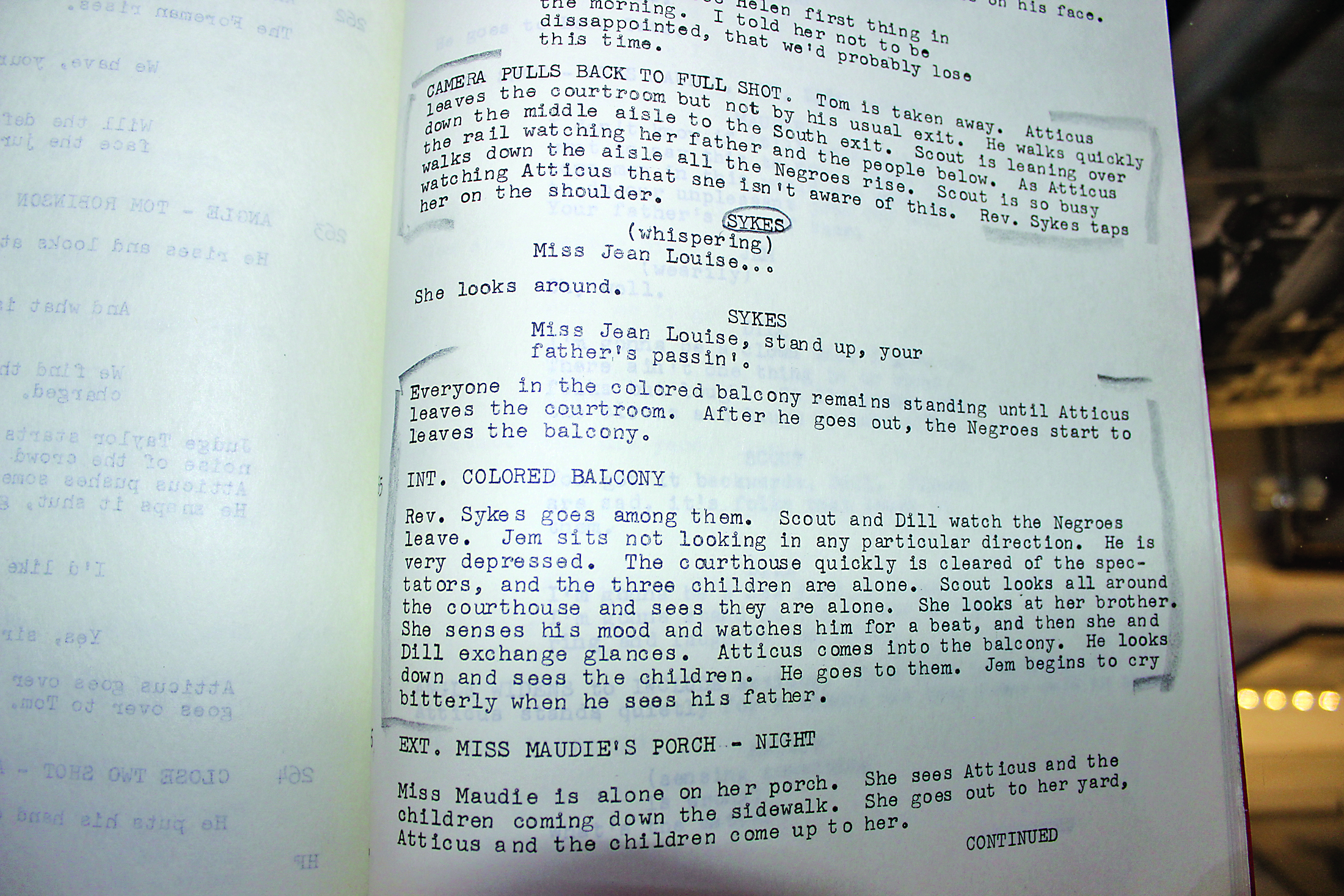
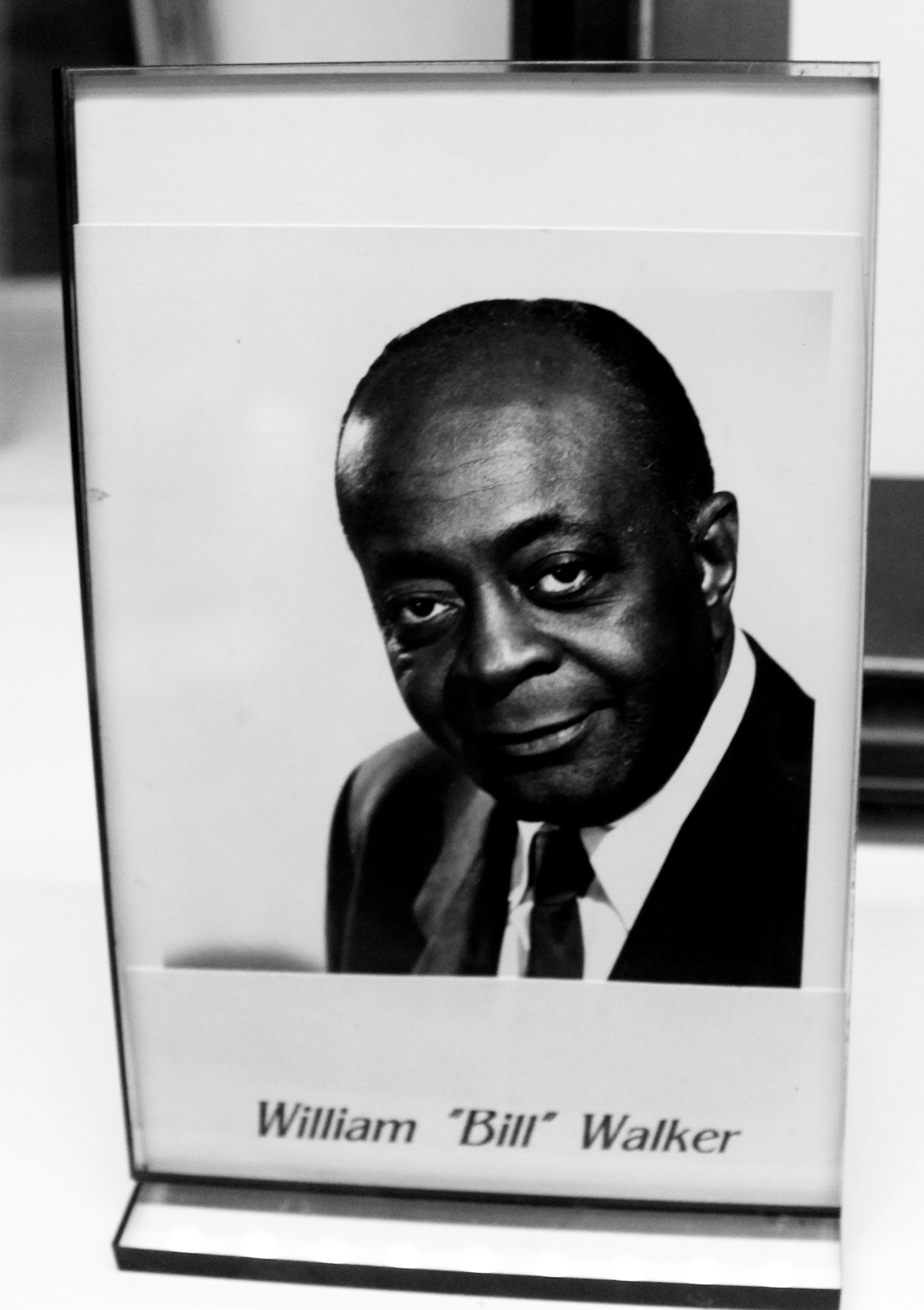
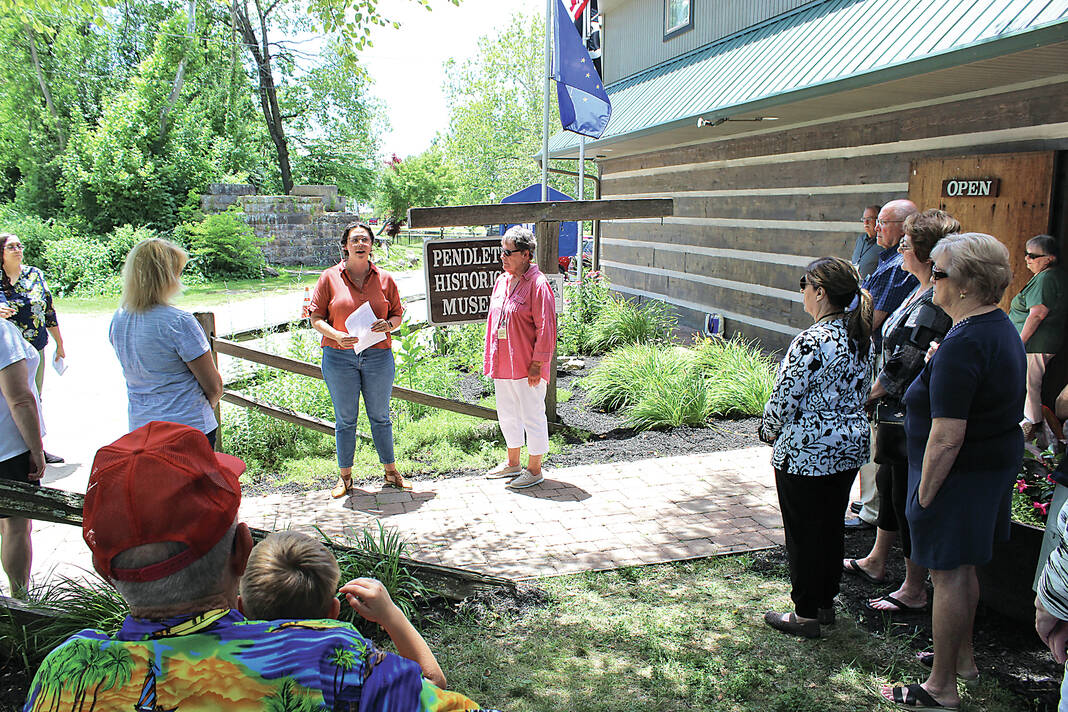
Lindsey Beckley, outreach coordinator for Indiana Historical Bureau, talks to a group of people gathered for the unveiling of the marker honoring Hollywood actor and Pendleton native William “Bill” Walker.
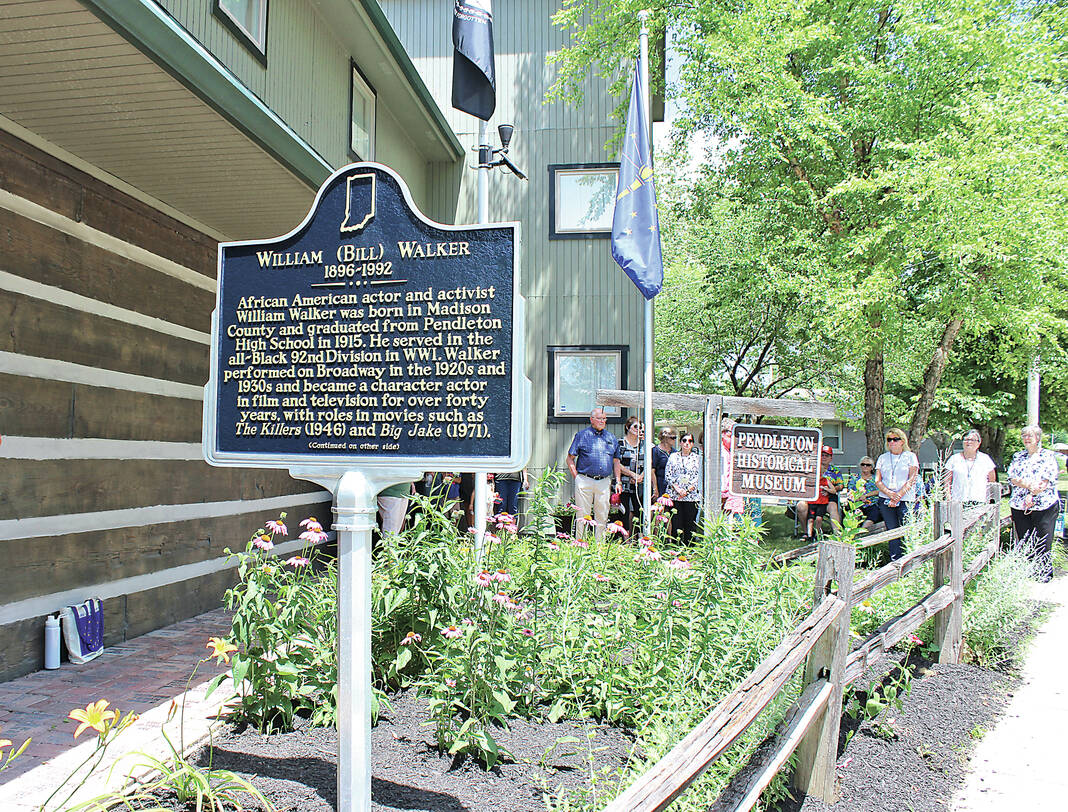
The front of the William Walker historical marker.
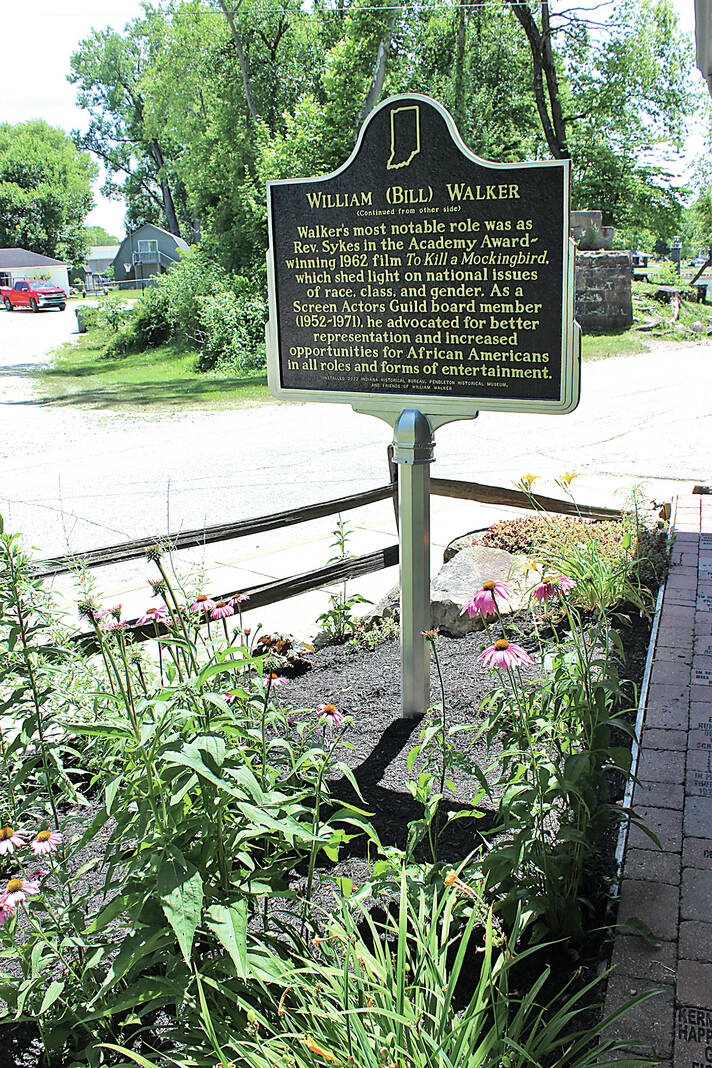
The back of the William Walker historical marker.
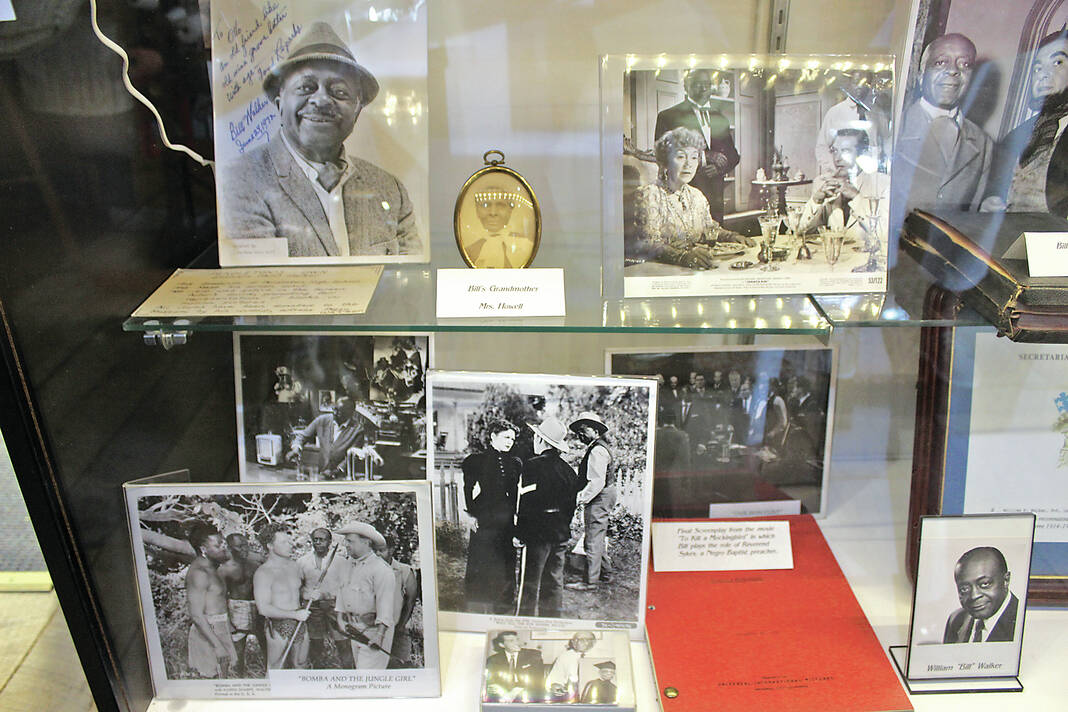
A William Walker display cabinet at Pendleton Historical Museum.

A copy of the script for “To Kill a Mockingbird,” a film made in 1962 starring Gregory Peck in which William “Bill” Walker played the Rev. Sykes.
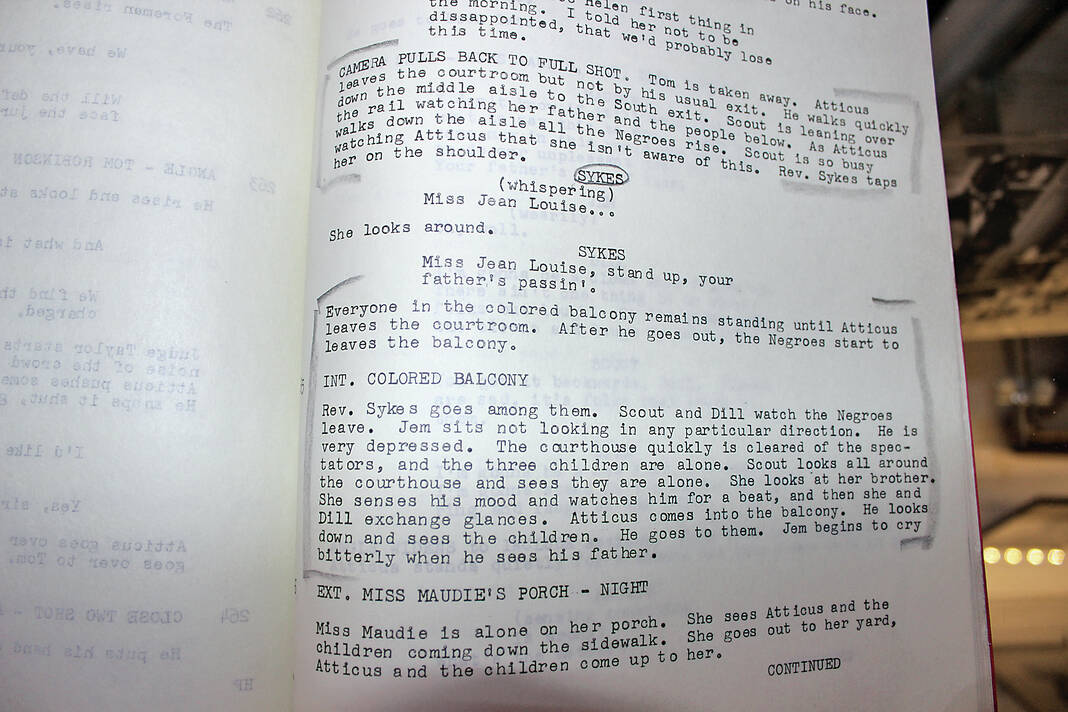
A copy of the script for the 1962 film “To Kill a Mockingbird,” opened to a page showing one of Pendleton native’s William “Bill” Walker’s lines as the Rev. Sykes.
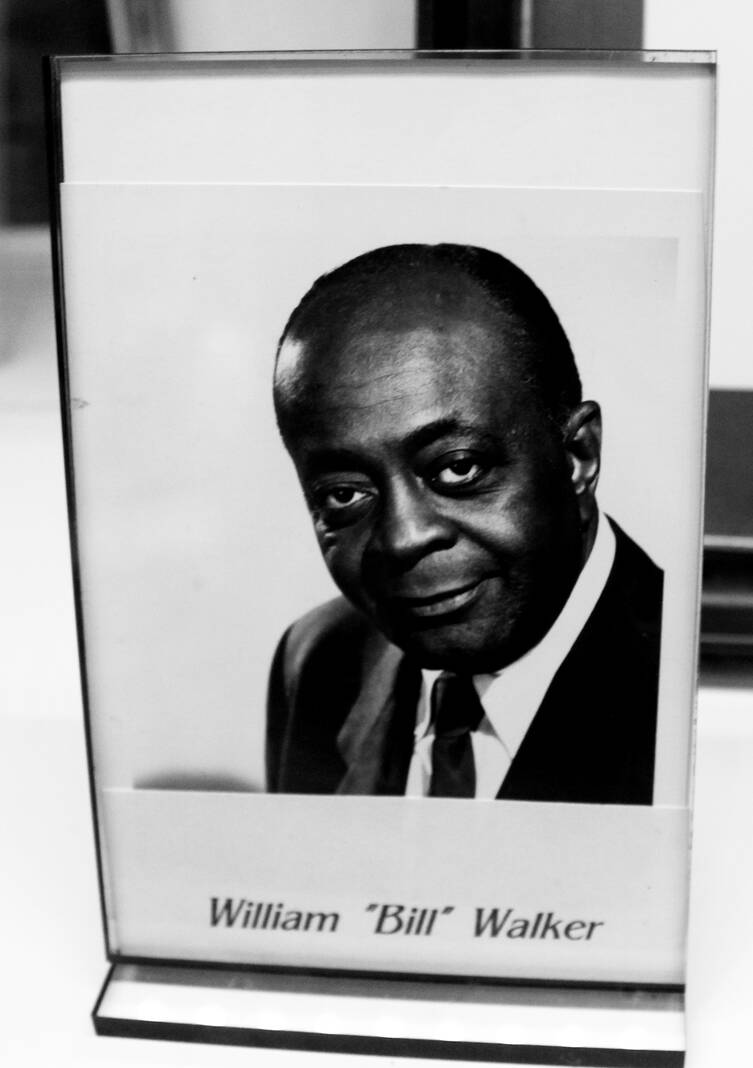
William (Bill) Walker
PENDLETON — That Pendleton-born actor William “Bill” Walker appeared in TV shows and movies, including the 1962 film “To Kill a Mockingbird” starring Gregory Peck, is no secret.
But the full extent of Walker’s life story is one the Pendleton Historical Museum board thought deserved more attention.
To that end, after three years of effort, the board — with the help of a state agency and donors — has installed a large historical marker in Falls Park to better honor Walker’s legacy.
“The more we learned about William Walker, the better a story it became,” board Vice President Jeanette Isbell said as she addressed an audience of about 20 people at a dedication ceremony on Friday.
Story continues below photos.
The marker sits on a post just west of the museum’s front entrance.
Walker was born in Pendleton on July 1, 1896, and graduated from Pendleton High School in 1915.
He died Jan. 27, 1992, in Woodland Hills, California.
According to IMDb — an online database of information related to films, television series and more — Walker accumulated 187 credits between 1945 and 1987.
It shows Walker appeared in the television shows Perry Mason in 1959, “The Twilight Zone” in 1964 and “The Rockford Files” in 1976, as well as films “Boy Who Caught a Crook” in 1961, “Tick, Tick, Tick” in 1970 and “Twilight’s Last Gleaming” in 1971, to name a few.
Lindsey Beckley, outreach coordinator for Indiana Historical Bureau, which runs the Indiana Historical Marker Program, said while Walker indeed left his mark on the big and small screens, his influence went far beyond that.
“Like Carole Lombard, James Dean, Steve McQueen and countless others, William Walker made it to Hollywood after growing up in Indiana and being influenced by his Hoosier roots,” Beckley said.
“While most recognized for his role in To Kill a Mockingbird, his significance (extends) far beyond that one film, or films in general. He spent nearly two decades as a member of the Screen Actors Guild Board of Directors, a position he used to advocate for better representation for Black actors — he knew that representation in media, whether that be television, film or even state historical markers, is important.”
Isbell said some Walker family history she found interesting included that his grandparents had been slaves, that his grandfather had fought on the Union side in the Civil War, and that after the war the family moved to Pendleton via horse-drawn wagon.
“They quickly became part of the town,” Isbell said.
There’s speculation the town’s Quaker roots played a role in attracting the family to town, Isbell said, but “we don’t know that for sure.”
According to Isbell, Walker said “he had pleasant memories” of life in Pendleton and didn’t feel like he was treated differently from anyone else.
Isbell said what makes Walker even more interesting is that he “did all kinds of things,” including enlisting and serving in World War I, attending Butler University and playing in a band in the Detroit area; he “was even a deputy sheriff,” she said.
Isbell said Walker was married to Peggy Cartwright, who died in 2001. Cartwright was an actor, too, and she, like Walker, provided items and information to the museum for its collection through the years.
Hugh and Rita Rider of Pendleton said they attended the marker dedication because they are big supporters of local history and making sure that it’s shared with residents.
“This is very special to us,” Rita said.
“I’ve lived here for 85 years,” Hugh said, and anybody from town who achieves the level of repute that Walker did, “we ought to make sure they (residents) know about it.”
Madison County Historian Stephen Jackson also attended the dedication.
“What a credit it is to Pendleton — they do such a wonderful job of remembering their history,” as well as promoting and interpreting it, Jackson said.
About Walker’s performance in “To Kill a Mockingbird,” Jackson said, “what a moment in film history, what a moment in American history. It will live on forever, or it should, anyway.”
Jackson was referring to the line spoken by Walker’s character, the Rev. Sykes: “Miss Jean Louise, stand up, your father’s passin’.”
“There’s not many films that I can remember lines from, but I do that one.”
Jackson’s not alone in ascribing enduring relevancy to the performance.
A one-minute YouTube outtake of the scene, during which Walker’s line is all that’s spoken, had 214 comments as of Monday, with the latest comment posted three weeks ago. A two-month-old comment reads “Gregory Peck believed that Bill Walker (Reverend Sykes) clinched him the Oscar with this scene.” A comment from four months ago reads, “My favorite movie scene of my life.” And a comment posted a year ago: “Simple 8 words are possibly the most potent and profound sentence in American literature, ‘Jean Louise stand up, your father is passing.’ Why does it mean so much to so many of us? Maybe it’s the dearth of decency and a life lived with ‘honor,’ a forgotten word.”
Jackson said sharing the connection of that scene to Pendleton can be especially meaningful to children, “to get pride instilled in them about where they live.”
Pendleton resident Daniel Medina attended the dedication and expressed a related sentiment.
“The takeaway was that, for me, it was very nice to hear that this is a welcoming community and one that people would feel good about moving to,” he said. “I guess that’s about pride in community. I think it would attract more people to our community if they know about it.”
About the marker
– The effort to install an Indiana State Historical Marker for William Walker began in 2019.
COVID delayed the process, which normally takes less than one year from the annual application deadline.
– The Walker marker is Pendleton’s fourth Indiana State Historical Marker (there are other types of markers in town). The first three are: Abolitionist Frederick Douglass, 2013; “Indians Murdered 1824,” 2016; industrial designer Walter Dorwin Teague, 2019.
The marker program is overseen by Indiana Historical Bureau, a division of Indiana State Library.
– Indiana Historical Bureau is accepting applications for new marker topics for the 2022-23 application cycle (for markers to be dedicated in 2023). The deadline is July 14.
– To be considered, topics must demonstrate statewide significance and be substantiated with primary source documentation.
– If the marker is for a person, he or she must have been deceased for at least 20 years. If it’s for an event, it must have happened at least 50 years ago.
– This year’s cost for a marker is $3,300, with a new $1,000 grant possible.
– The William Walker marker cost $2,950, with $1,250 provided by a grant from South Madison Community Foundation and the rest donated by two individuals.
For more details about the marker program, visit in.gov/history/state-historical-markers.
The marker
Side 1
William (Bill) Walker
1896-1992
African American actor and activist William Walker was born in Madison County and graduated from Pendleton High School in 1915. He served in the all-Black 92nd Division in WWI. Walker performed on Broadway in the 1920s and 1930s and became a character actor in film and television for over 40 years, with roles in movies such as The Killers (1946) and Big Jake (1971).
Side 2
Walker’s most notable role was as Rev. Sykes in Academy Award-winning 1962 film To Kill a Mockingbird, which shed light on national issues of race, class, and gender. As a Screen Actors Guild board member (1952-1971), he advocated for better representation and increased opportunities for African Americans in all roles and forms of entertainment.
